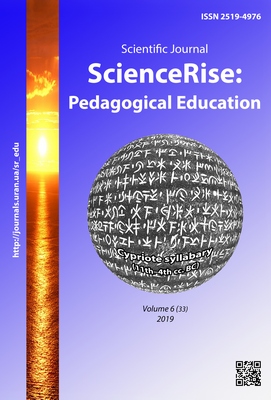Assessment of the disposition of the future Ph.D to research and innovation activity: criteria, indicators, levels
DOI:
https://doi.org/10.15587/2519-4984.2019.185525Keywords:
doctors of philosophy, disposition for research and innovation activity, postgraduate, criterion-level approachAbstract
The relevance of the research is the need to enhance the research and innovation training effectiveness of future PhD students, who are able to compete in the international scientific environment. A mechanism for assessing the disposition of future doctors of philosophy to research and innovation is presented in this article, using a criterion-level approach. The disposition is represented by a set of motivational and goal-oriented, personally-creative, content-active and reflective-perspective components. The motivational, creative, cognitive, activity and reflexive disposition criteria are defined. These criteria are measured through the system of proposed indicators. Low (adaptation), medium (search) and high (creative) levels of disposition for research and innovation activity are defined. The component characteristic of the levels of disposition is presented, which is a prerequisite for the construction of a conceptual model of research and innovation training of graduate students. It is proved, that the general level of disposition of future doctors of philosophy to research and innovation activity is determined mainly by its productivity. Low-level graduate students will have only those results of research and innovation activity that are stipulated by the formal requirements, i.e. abstracts at national and international conferences and articles in the state language in professional editions of Ukraine.The medium level is characterized by the fact that a graduate student: has publications in foreign editions; finds ways of their practical application, which is confirmed by existing patents; competes for additional funding, so prepares applications and participates in grants, scholarship awards. Finally, a high level of disposition describes a graduate student, who has publications in Scopus and Web of Science international science databases and / or real experience in attracting external funding to implement his/her own projects (grant, award, scholarship, contract, license sold). The criteria, indicators and levels, identified in the article, provide an opportunity to diagnose the disposition of future doctors of philosophy to research and innovation activity in the process of their preparation, as well as to identify those components of that disposition that are not formed enough
References
- Kwiek, M. (2015). Uniwersytet w dobie przemian. Instytucje i kadra akademicka w warunkach rosnñcej konkurencji. Warszawa: Wydawnictwo Naukowe PWN SA, 544.
- Dorozhnia karta intehratsii Ukrainy do Yevropeiskoho doslidnytskoho prostoru (ERA-UA) (2018). Ministerstvo osvity i nauky Ukrainy. No. 3/1-7. 22.03.2018.
- Bordiug, N. (2019). Criteria and formation levels of professional competences of specialists of the nature protection branch in ecological monitoring. ScienceRise: Pedagogical Education, 4 (31), 4–7. doi: http://doi.org/10.15587/2519-4984.2019.174106
- Kosheleva, N. H. (2014). Vyznachennia kryteriiv otsiniuvannia hotovnosti maibutnikh ekonomistiv do innovatsiinoi fakhovoi diialnosti. Naukova skarbnytsia osvity Donechchyny, 2 (19), 48–51.
- Kovalchuk, O. M. (2016). Pidhotovka mahistriv humanitarnykh spetsialnostei do innovatsiinoi profesiinoi diialnosti v umovakh stupenevoi osvity. Lutsk, 312.
- Muratova, E. I., Fedorov, I. V. (2009). Metodologiia i tekhnologiia ocenki gotovnosti vypusknikov tekhnicheskikh vuzov k innovacionnoi deiatelnosti. Problemi іnzhenerno-pedagogіchnoi osvіti, 24-25, 269–281.
- Andrieiev, A. M. (2018). Pidhotovka maibutnoho vchytelia fizyky do orhanizatsii innovatsiinoi diialnosti uchniv u navchalnomu protsesi. Zaporizhzhia: STATUS, 380.
- Iaroshenko, O. G. (2016). Integraciia obrazovatelnoi i nauchno-issledovatelskoi deiatelnosti kak sostavliaiuschikh podgotovki buduschogo specialista v usloviiakh modernizacii vysshego obrazovaniia. Mezhdunarodnii zhurnal prikladnikh i fundamentalnikh issledovanii, 4, 322–325.
- Mеnyajlo, V. (2019). Structure of the readiness of future doctor of philosophy to research-innovative activities. Balkan Scientific Review, 3 (1 (3)), 49–51.
- Verderame, M. F., Freedman, V. H., Kozlowski, L. M., McCormack, W. T. (2018). Competency-based assessment for the training of PhD students and early-career scientists. ELIFE, 7. doi: http://doi.org/10.7554/elife.34801
Downloads
Published
How to Cite
Issue
Section
License
Copyright (c) 2019 Viktoriia Meniailo

This work is licensed under a Creative Commons Attribution 4.0 International License.
Our journal abides by the Creative Commons CC BY copyright rights and permissions for open access journals.
Authors, who are published in this journal, agree to the following conditions:
1. The authors reserve the right to authorship of the work and pass the first publication right of this work to the journal under the terms of a Creative Commons CC BY, which allows others to freely distribute the published research with the obligatory reference to the authors of the original work and the first publication of the work in this journal.
2. The authors have the right to conclude separate supplement agreements that relate to non-exclusive work distribution in the form in which it has been published by the journal (for example, to upload the work to the online storage of the journal or publish it as part of a monograph), provided that the reference to the first publication of the work in this journal is included.







